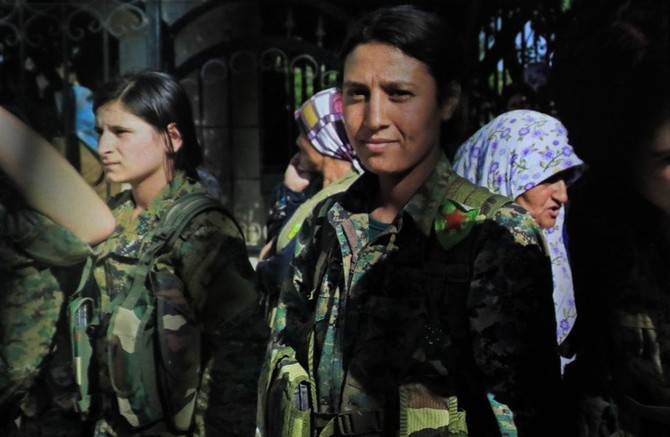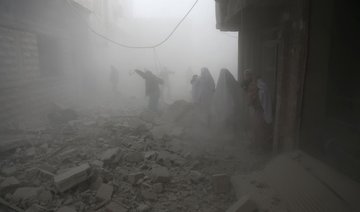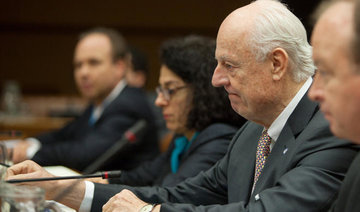AFRIN: Thousands of Kurds gathered in Syria's Afrin Saturday to mourn fighters and civilians killed in a blistering Turkish assault on the region - including female combattant Barin Kobani.
But there was no casket for the young woman fighter.
Her mutilated body appeared in a shocking video published earlier this week, prompting accusations by her family and Kurdish officials that she was "defiled" by Turkish-backed rebels.
Family members have yet to retrieve her corpse from those rebels and could not bury her alongside 17 other fighters and civilians during the mass funeral on Saturday.
"They all have their burials, except my daughter Barin," said her shell-shocked mother, surrounded by wailing mourners carrying posters of the woman in her early 20s.
"They tore up her body. She doesn't get a funeral. Oh, my daughter."
Footage published this week by the Syrian Observatory for Human Rights showed the lifeless body of a woman lying on the ground, surrounded by a dozen men, some armed.
The woman's sweater is pulled above her head and trousers dragged low, revealing a large blackened abrasion from her chest down to her bellybutton.
One man is seen stepping on her left breast.
The lifeless body was identified by Kurdish officials and locals who knew Kobani.
The Britain-based Observatory said it received the video from a Syrian rebel fighting as part of Turkey's two-week assault against the Kurdish People's Protection Units (YPG), which control Afrin.
Kobani, whose real name is Amina Omar, took up arms in 2014 to battle Daesh as it swept through parts of Syria and neighbouring Iraq.
She joined the Women's Protection Units (YPJ), the all-female arm of the YPG, and fought Daesh in the border town of Kobane in 2015 and in the jihadists' self-styled capital Raqa last year.
The YPJ on Friday announced the death of four of its fighters - including Kobani - and accused Turkey-backed factions of "mutilating them."
YPJ spokeswoman Nesrin Abdullah told AFP that Kobani and the other three female fighters were caught up in clashes with the pro-Ankara rebels, refused to withdraw, and "fought until death."
"I swear to God, we'll avenge you," cried out Kobani's brother, thirty-year-old Aref Mustafa Omar, at Saturday's funeral.
Sweat poured down his face and mixed with his tears as he sobbed next to his other sister, brother, and their elderly, stoic mother.
He told AFP that his sister had detonated explosives she was carrying because she did not want to be taken hostage.
"They defiled her dead body brutally, unnaturally. They put her on their media to show their masculinity,"said Omar.
"She was a saint," he said, before his face turned a yellowish colour and he collapsed.
Men and women of all ages paid their respects to the Kobani family at the funeral, telling her mother that Barin had become a symbol.
"She's not just your daughter, she's our daughter too," one mourner said.
Turkey, which has blacklisted the YPG as a "terrorist" group, launched its offensive on Afrin on January 20.
It has bombed and battled Kurdish fighters in northern Syria multiple times in recent years, as have rebel factions allied with Ankara.
Turkey has provided political and military support to Syria's fractious opposition since the uprising began in 2011.
The video of Kobani's body sparked outrage in the Kurdish community and on social media, prompting calls for an investigation.
Syria's exiled opposition government, which is based in Turkey and oversees an array of rebel factions, said it had begun investigating the incident.
"We have formed a committee to... determine the accuracy of allegations of mutilation of the fighter's body by the national army," it said in a statement.
And the Istanbul-based National Coalition opposition grouping condemned the actions in the video as "criminal acts."
Syrian Kurds mourn female fighter shown mutilated in video
Syrian Kurds mourn female fighter shown mutilated in video

Sultan of Oman, Russian president mark 40th anniversary of establishing diplomatic ties

- Putin announced plans to stage summit with Arab League group of states later this year
- Putin and Sultan Haitham welcomed establishment of Joint Economic Committee and the mutual exemption of entry visas
LONDON: Sultan Haitham bin Tariq became the first Omani head of state to visit Russia this week, discussing various regional and international topics with President Vladimir Putin.
During a meeting with Sultan Haitham at the Grand Hall of the Kremlin Palace on Tuesday, Putin announced plans to stage a summit with the Arab League group of states later this year.
"We plan to hold a summit between Russia and Arab countries this year," Putin told Sultan Haitham, who concluded late on Tuesday on a two-day visit to Russia.
"Many of our friends in the Arab world support this idea," he added, inviting Sultan Haitham to the summit without specifying the date and location.
Russia and Oman are marking the 40th anniversary of establishing diplomatic ties.
Putin noted that Sultan Haitham was among the signatories of the agreement establishing diplomatic relations between Moscow and Muscat in 1985, according to the Oman News Agency.
The two leaders emphasized the importance of enhancing joint investment opportunities and improving communication between their countries, the ONA added.
Putin and Sultan Haitham welcomed the signing of several memoranda of understanding, the establishment of a Joint Economic Committee, and the mutual exemption of entry visas for citizens of both countries.
During their meeting, they stressed the need to create an independent Palestinian state. They affirmed their support for international efforts to achieve an immediate ceasefire in the Gaza Strip and called for a complete Israeli withdrawal from Gaza and all other occupied Palestinian territories.
For Iraqi Christians, pope’s visit was a rare moment of hope

- His 2021 visit to Iraq, the first ever by a pope, came after years of conflict and displacement
BAGHDAD: The death of Pope Francis has sent shockwaves through Iraq’s Christian community, where his presence once brought hope after one of the darkest chapters in the country’s recent history.
His 2021 visit to Iraq, the first ever by a pope, came after years of conflict and displacement. Just a few years before that, many Iraqi Christians had fled their homes as Daesh militants swept across the country.
Christian communities in Iraq, once numbering over a million, had already been reduced to a fraction of their former number by decades of conflict and mass emigration.
In Mosul, the site of some of the fiercest battles between Iraqi security forces and Daesh, Chaldean Archbishop Najeeb Moussa Michaeel recalled the pope’s visit to the battle-scarred city at a time when many visitors were still afraid to come as a moment of joy, “like a wedding for the people of Mosul.”
“He broke this barrier and stood firm in the devastated city of Mosul, proclaiming a message of love, brotherhood, and peaceful coexistence,” Michaeel said.
As Francis delivered a speech in the city’s Al-Midan area, which had been almost completely reduced to rubble, the archbishop said, he saw tears falling from the pope’s eyes.
Sa’dullah Rassam, who was among the Christians who fled from Mosul in 2014 in the face of the Daesh offensive, was also crying as he watched the pope leave the church in Midan that day.
Rassam had spent years displaced in Irbil, the seat of northern Iraq’s semiautonomous Kurdish region, but was among the first Christians to return to Mosul, where he lives in a small house next to the church that Francis had visited.
As the pope’s convoy was leaving the church, Rassam stood outside watching.
“It was the best day of my life,” Rassam said.
Turkiye’s opposition set to defy protest ban on Wednesday

- Ozel reiterated a call to stage the rally in a post on X late Tuesday despite a government banned on gatherings
- “April 23 cannot be banned,” he said
ISTANBUL: Turkiye’s opposition has called on supporters to rally outside the parliament in Ankara on Wednesday in defiance of an official ban on gatherings on a symbolic day for the republic.
A month after the arrest of Istanbul’s mayor Ekrem Imamoglu — President Recep Tayyip Erdogan’s biggest political rival — the president of Imamoglu’s Republican People’s Party (CHP) said he would speak outside parliament as the country marks National Sovereignty Day.
Ozgur Ozel, who was recently named as leader of the CHP, which was established by the founder of the Turkish Republic, Mustafa Kemal Ataturk. Ozel reiterated a call to stage the rally in a post on X late Tuesday despite a government banned on gatherings.
“April 23 cannot be banned. Our gathering in front of parliament and our march to Anitkabir (Ataturk’s Tomb) cannot be stopped,” he said.
“I invite all residents of Ankara, especially young people and students, and everyone who will be in Ankara tomorrow, to go to Parliament at 5:00 p.m. (1400 GMT), Turkish flags in hand. Sovereignty belongs to the nation.”
Imamoglu also referenced the rally from his cell at Silivri prison in Istanbul, where he has been held on corruption charges since March 25.
“I will watch this march for national sovereignty from prison. I will be at your sides. I will be marching with you,” Imamoglu said on X.
Imamoglu’s arrest has triggered a wave of protests in Turkiye’s main cities primarily driven by young people.
Israel shares, then deletes, condolences over pope’s death

- The foreign ministry said the pope had made 'statements against Israel' and that the social media post had been published in 'error'
- Prime Minister Benjamin Netanyahu, who leads a far-right coalition of religious and nationalist parties, has not commented on the pope’s death
JERUSALEM: The Israeli government shared and then deleted a social media post offering condolences over the death of Pope Francis, without saying why, though an Israeli newspaper linked the decision to the late pontiff’s criticism of the war in Gaza.
The verified @Israel account had posted on Monday a message on social media platform X that read: “Rest in Peace, Pope Francis. May his memory be a blessing,” alongside an image of the pope visiting the Western Wall in Jerusalem.
The Jerusalem Post quoted officials at the foreign ministry as saying that the pope had made “statements against Israel” and that the social media post had been published in “error.”
The foreign ministry, which social media platform X states on its website is linked to the verified @Israel account, did not immediately respond to a Reuters request for comment.
Francis, who died on Monday aged 88, suggested last November that the global community should study whether Israel’s military campaign in Gaza constitutes a genocide of the Palestinian people, in some of his most explicit criticism yet of Israel’s conduct in its war with Hamas that began in Oct. 2023.
In January the pope also called the humanitarian situation in Gaza “shameful,” prompting criticism from Rome’s chief Jewish rabbi who accused Francis of “selective indignation.”
Israel says accusations of genocide in its Gaza campaign are baseless and that it is solely hunting down Hamas and other armed groups.
Israeli Prime Minister Benjamin Netanyahu, who leads a far-right coalition of religious and nationalist parties, has not commented on the pope’s death.
However, Israeli President Isaac Herzog on Monday sent a message of condolence to Christians in the Holy Land and around the world, describing Francis as “a man of deep faith and boundless compassion.”
Relations between the Catholic Church and Judaism have improved in recent decades, after centuries of animosity.
Pope Francis was usually careful during his 12-year pontificate about taking sides in conflicts, and he condemned the growth of antisemitic groups, while also speaking by phone with Gaza’s tiny Christian community every evening during the war.
Francis in 2014 visited the Western Wall — the most sacred prayer site in Judaism — and also prayed at a section of a wall built by Israel in the occupied West Bank dividing Jerusalem and Bethlehem.
Detained Palestinian activist in Vermont prison says he’s ‘in good hands,’ focused on peacemaking

- “I’m staying positive by reassuring myself in the ability of justice and the deep belief of democracy,” Mahdawi said
- The US Justice Department has not said why he’s being detained
VERMONT, USA: A Palestinian man who led protests against the war in Gaza as a student at Columbia University and was recently arrested during an interview about finalizing his US citizenship says he’s “in good hands” at the Vermont prison where he is being held.
Mohsen Mahdawi, a legal permanent resident, was arrested April 14 in Colchester, Vermont. He met Monday with US Sen. Peter Welch of Vermont, a Democrat, who posted it on X.
“I’m staying positive by reassuring myself in the ability of justice and the deep belief of democracy,” Mahdawi said in Welch’s video. “This is the reason I wanted to become a citizen of this country, because I believe in the principles of this country.”
Welch’s office said Mahdawi was being detained at the Northwest State Correctional Facility in St. Albans, Vermont. His case is scheduled for a status conference Wednesday. His lawyers have called for his release.
The US Justice Department has not said why he’s being detained. The New York Times reported April 15 that Secretary of State Marco Rubio wrote a memo that says Mahdawi’s activities could “potentially undermine” the Middle East peace process.
“We do not comment on on any ongoing litigation,” the State Department press office said in response to an email seeking comment.
Rubio has cited a rarely used statute to justify the deportation of Columbia University graduate student Mahmoud Khalil. It gives Rubio power to deport those who pose “potentially serious adverse foreign policy consequences for the United States.”
An immigration judge ruled April 11 that Khalil can be forced out of the country as a national security risk, after lawyers argued the legality of deporting the activist who participated in pro-Palestinian demonstrations. His lawyers plan to appeal.
Mahdawi said that in studying for his citizenship test, he learned “that the freedom of speech and religion and assembly is guaranteed to everyone in the United States, which is part of the foundation of this country.”
Mahdawi said his work “has been centered on peacemaking.”
“My empathy, as I mentioned before, extends beyond the Palestinian people and my empathy extends to the Jews and to the Israelis,” he said. “And my hope and my dream is to see this conflict, if one might say, to see an end to the war, an end to the killing, to see a peaceful resolution between Palestinians and Israelis. How could this be a threat to anybody, except the war machine that is feeding this?”
Welch responded, “It would be good for everybody for us to have peace.”
Mahdawi said, “I want to tell everyone that I feel so loved and so supported. And I am here in good hands. I am centered, I am clear, I am grounded. And I don’t want you to worry about me.”
According to the court filing, Mahdawi was born in a refugee camp in the West Bank and moved to the United States in 2014. He recently completed coursework at Columbia and was expected to graduate in May before beginning a master’s degree program there in the fall.
As a student, Mahdawi was an outspoken critic of Israel’s military campaign in Gaza and organized campus protests until March 2024.





















